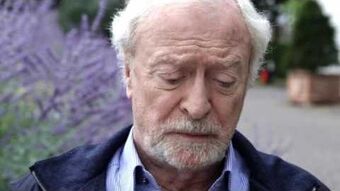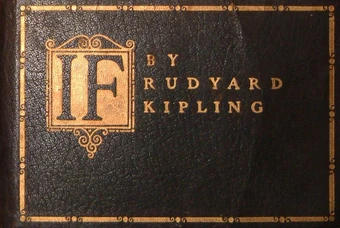If you can keep your head when all about you
Are losing theirs and blaming it on you,
If you can trust yourself when all men doubt you
But make allowance for their doubting too,
If you can wait and not be tired by waiting,
Or being lied about, don't deal in lies,
Or being hated, don't give way to hating,
And yet don't look too good, nor talk too wise:
If you can dream'and not make dreams your master,
If you can think'and not make thoughts your aim;
If you can meet with Triumph and Disaster
And treat those two impostors just the same;
If you can bear to hear the truth you've spoken
Twisted by knaves to make a trap for fools,
Or watch the things you gave your life to, broken,
And stoop and build 'em up with worn-out tools:
If you can make one heap of all your winnings
And risk it all on one turn of pitch-and-toss,
And lose, and start again at your beginnings
And never breath a word about your loss;
If you can force your heart and nerve and sinew
To serve your turn long after they are gone,
And so hold on when there is nothing in you
Except the Will which says to them: 'Hold on!'
If you can talk with crowds and keep your virtue,
Or walk with kings - nor lose the common touch,
If neither foes nor loving friends can hurt you;
If all men count with you, but none too much,
If you can fill the unforgiving minute
With sixty seconds' worth of distance run,
Yours is the Earth and everything that's in it,
And - which is more - you'll be a Man, my son!
– Rudyard Kipling
"If—'" is a poem written in 1895[1] by British Nobel laureate Rudyard Kipling. It was originally published in the "Brother Square Toes" chapter of Rewards and Fairies, Kipling's 1910 collection of short stories and poems.
History[]
Like William Ernest Henley's "Invictus", "If-- is a memorable evocation of Victorian stoicism and the 'stiff upper lip' that popular culture has made into a traditional British virtue.[2] Its status is confirmed both by the number of parodies it has inspired, and by the widespread popularity it still enjoys amongst Britons.
Background[]
According to Kipling in his autobiography Something of Myself, posthumously published in 1937, the poem was inspired by Dr. Leander Starr Jameson, who in 1895 led a raid by British forces against the Boers in South Africa, subsequently called the Jameson Raid.[3] This defeat increased the tensions that ultimately led to the Second Boer War. The British press, however, portrayed Jameson as a hero in the middle of the disaster, and the actual defeat as a British victory.
Reaction[]

IF, Rudyard Kipling's poem, recited by Sir Michael Caine
Kipling himself noted in Something of Myself that the poem had been "printed as cards to hang up in offices and bedrooms; illuminated text-wise and anthologized to weariness".[4]
T.S. Eliot in his essays on Kipling's work describes Kipling's verse as "great verse" that sometimes unintentionally changes into poetry. George Orwell - an ambivalent admirer of Kipling's work who hated the poet's politics - compared people who only knew "If-- "and some of his more sententious poems", to Colonel Blimp.[5]
Khushwant Singh, an Indian writer, claims that Kipling's "If--" is "the essence of the message of The Gita in English".[6] The text Singh refers to is the Bhagavad Gita, the ancient Indian scripture.
Translations[]
"If-- has been translated into many languages. It was translated by Nobel Peace Prize winner, Aung San Suu Kyi.Template:Cn Another Nobel laureate to translate "If-- was Yugoslav writer Ivo Andrić.Template:Cn
Some translations are:
- Indien, into Dutch by J.M. de Vries de Waal.[7]
- ×× (im), into Hebrew by Eliyahu Tsiper [8]
- Ha into Hungarian by Gábor Devecseri[9] Dezső Kosztolányi and Lőrinc Szabó.
- Ja, into Latvian by unknown.[10]
- Vitanao ve?, into Malagasy by Rajaona Andriamananjara[11]
- Se, into Portuguese by Guilherme de Almeida[12]
- Jeżeli..., into Polish by unknown [13]
- Dacă, into Romanian, by Dan Duţescu[14]
- Заповедь, into Russian by Mikhail Lozinsky.[15]
- ЕÑли..., into Russian by Samuil Marshak.[16]
- KeÄ into Slovak by ĽubomÃr Feldek[17]
- Když into Czech by Otokar Fischer[18]
- If. into Hindi by Prabhash Nirbhay [19]
- "Nếu" into Vietnamese by Nguyễn Viết Thắng.
Recognition[]
"If—" was voted the United Kingdom's favorite poem in a 1995 BBC opinion poll.[20] It has often been voted Britain's favourite poem.[21][22]
The poem's line, "If you can meet with Triumph and Disaster and treat those two impostors just the same" is written on the wall of the Centre Court players' entrance at the British tennis tournament, Wimbledon, and the entire poem was read in a promotional video for the Wimbledon 2008 gentleman's final by Roger Federer and Rafael Nadal.[23][24][25]
[]
References[]
Notes[]
- ↑ Journals: Captain Scott's last expedition Oxford University Press, 2006
- ↑ Spartans and Stoics - Stiff Upper Lip - Icons of England Retrieved February 20, 2011
- ↑ Fordham.edu: Modern History Sourcebook
- ↑ etext of Something of Myself
- ↑ George Orwell, Review of A Choice of Kipling's Verse , 1942
- ↑ Khushwant Singh, Review of The Book of Prayer by Renuka Narayanan , 2001
- ↑ 4umi.com: Indien, Kipling translated
- ↑ The translation in Wikisources
- ↑ Tau.ac.il: Comments on Two Hungarian Translations
- ↑ E-Mistika
- ↑ http://worldlibrary.net/eBooks/Wordtheque/mg/AAAAAF.TXT
- ↑ Folha Online 5/5/2007
- ↑ NajpiÄ™kniejsze wiersze
- ↑ Rudyard Kipling - IF / DACÄ‚
- ↑ Lib.ru: Five Russian versions
- ↑ Lib.ru: Five Russian versions
- ↑ KeÄ published in Pravda (line breaks are missing)
- ↑ [1]
- ↑ http://prabhashnirbhay.blogspot.com/2011/04/if.html
- ↑ "If--- by Rudyard Kipling", Academy of American Poets, Poets.org, Web, Sep. 12, 2011.
- ↑ Emma Jones (2004) The Literary Companion Robson, 2004.
- ↑ Mike Robinson (2004) Literature and tourism
- ↑ Des Kelly (7th July 2008) Federer's a winner for taking defeat like a man, my son Daily Mail Retrieved 30 November 2010
- ↑ Rafael Nadal: Maître sur terre L'EQUIPE, 2008
- ↑ René Stauffer The Roger Federer Story: Quest for Perfection New Chapter Press
External links[]
- Text
- "If —" at Representative Poetry Online
- Authentic digital editions archive of "If--" multiform editions at Dalhousie University Library, Canada - Original Author Autographed, Calligraphed/Typed Broadsides, Collector Multipage and Human Voice, Enhanced Video based Multimedia"
- Audio / video
- George Horne's typographic animation of "If--" (read by Des Lynam).
- "If" at YouTube
- Free human-read audio recordings of "If--" at LibriVox
- About
| This page uses Creative Commons Licensed content from Wikipedia. (view article). (view authors). |
